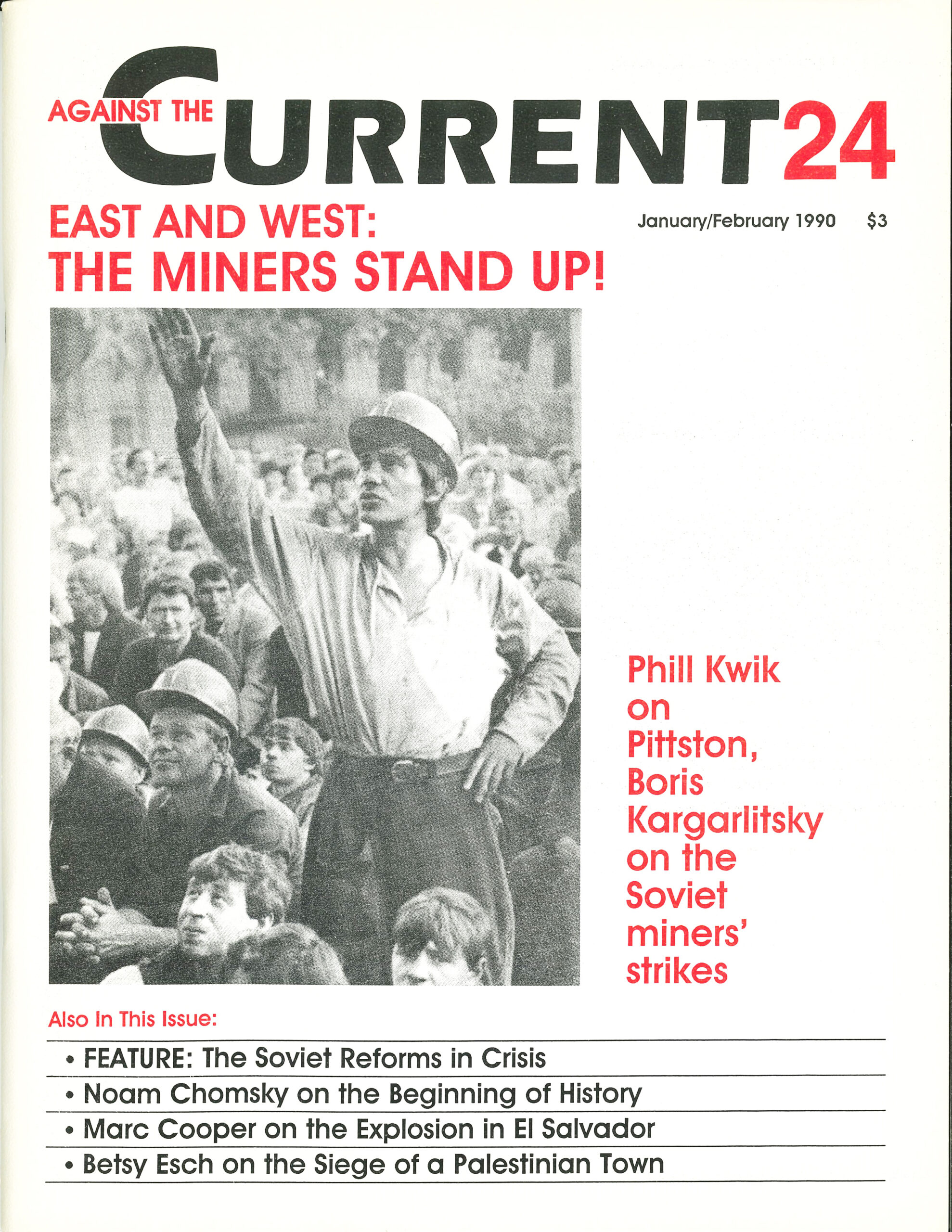Against the Current, No. 24, January/February 1990
-
Where the Cold War Lives On
— The Editors -
New Stage in Salvadoran Struggle
— Susan Weissman interviews Marc Cooper -
Pittston: Class War in the Coalfields
— Phil Kwik -
Students Organize for Reproductive Rights
— Karin Baker -
From Abortion Rights to Feminism
— Camille Colatosti -
Marching with Beit Sahour
— Betsy Esch - Solidarity with Michel Warshawsky
-
The Beginning of History
— Noam Chomsky -
Soviet Miners Stand Up
— Susan Weissman interviews Boris Kagarlitsky -
The Disintegration of Gorbachev?
— Hillel Ticktin -
What Glasnost Is--and Isn't
— John Marot -
The "Revolution from Above" Fallacy
— John Marot -
Common Interest or Class Politics?
— Justin Schwartz -
Wheelbarrow Socialism
— Don Fitz -
Nicaragua: An Economy Under Siege
— Katherine Gonzalez -
Random Shots: Ringing in the 1990s
— R.F. Kampfer -
"Roger and Me"
— R.F. Kampfer -
Revolution, War and Feminism
— Janet Siskind
The Editors
IF THE BUSH ADMINISTRATION took an attitude toward Central America similar to that adopted by Mikhail Gorbachev, for his own reasons, toward Eastern Europe, then revolutionary and democratic social and political change would be very much on the agenda throughout Central America—through social movements of a massive and largely non-violent character. Instead, while the peoples of Eastern Europe take the first steps toward a hopeful albeit uncertain future, the peoples of Central America—most visibly today in El Salvador, but in the other states of the region as well—confront escalating U.S. military and political intervention. Washington and its European allies may be proclaiming the end of the Cold War, but they clearly aren’t referring to the region a distinguished U.S. Secretary of State once referred to as “our little region that never bothered anyone.”
In Eastern Europe, police state apparatuses are forced to negotiate with their opposition. In El Salvador, the prospects for dialogue were buried in the rubble of the National Federation of Salvadoran Workers (FENASTRAS) office, shattered by a death-squad bomb on October 31. This fourth bombing of the FENASTRAS office in the past eighteen months was also the deadliest, killing FENASTRAS’ talented and charismatic leader, Febe Elizabeth Velasquez, and nine other unionists, in addition to wounding dozens more.
The FENASTRAS bombing precipitated the Farabundo Marti National Liberation Front’s (FMLN) largest offensive of the year on November 11. The offensive, now in its second month, is now the only hope left for the social movements that have organized and embodied the hopes of workers, peasants, the displaced, the relatives of the disappeared, and all the other victims of the long agony in El Salvador.
The U.S. government, in a stunning propagandistic inversion of reality, is trying to depict the FMLN in El Salvador and Nicaragua’s Sandinista government as the last living tentacles of the erstwhile Evil Empire. While Secretary of State Baker refers to El Salvador as the greatest stumbling block for improved U.S.-Soviet relations,” and condemns Nicaragua for allegedly supplying weapons to the FMLN even as the Soviets appear to retreat from most of their commitments to liberation movements within the recognized U.S. “sphere” it becomes all the more imperative that the solidarity movement here retain a focus encompassing all of Central America.
The United States continues its efforts to destabilize the Nicaraguan elections and economy. The armies of Honduras and Guatemala go on alert for a possible invasion of El Salvador. The linkages between the self-determination of the Salvadoran people and that of peoples throughout the isthmus become ever more important.
Demonstrations against troop deployments to Honduras —or, for example, the protest called for this January in Los Angeles in solidarity with the Guatemalan people—are, of course, important in their own right They are also vital in ending U.S. intervention in El Salvador, and the region as a whole, as are the tremendous protests that have occurred already against the U.S. role in El Salvador itself.
As socialists we are for the Salvadoran revolution, for the popular movement, and in solidarity with the magnificent struggle of the FMLN, without hesitation or apology. It is particularly crucial, we believe, to grasp two points. The first, as now seems clear and as is explored elsewhere in this issue of Against the Current, is that the new offensive will be a continuing, protracted, and ultimately decisive process. The second is that the wholesale repression of the church and popular movement, seen most spectacularly in the murder of the Jesuits and the victimization of Jenifer Casolo, remains a daily reality.
Given the corporate media’s blackout of this repression—as well as what Americas Watch referred to as Congress’ shameful failure to cut aid to the Salvadoran government—the anti-intervention movement will have to demonstrate in such a way as to expose the repression so that it might pressure the Congress. Those Congressional liberals whose special role has been to preach Cristiani’s moderation” must not be allowed to exercise a similar function in the current situation.
Finding a few scapegoats for the Jesuit murder does not even represent the beginning of a solution, and should certainly not be enough to let Congress off the hook for its complicity. The ARENA regime and those like it in Central America must be completely dismantled; the government that funds their atrocities must stop doing so. And the solidarity movements here must take full advantage of the current focus on the region so that such demands can become part of a dialogue that the administration and its congressional junior partners are already trying to foreclose.
January-February 1990, ATC 24

